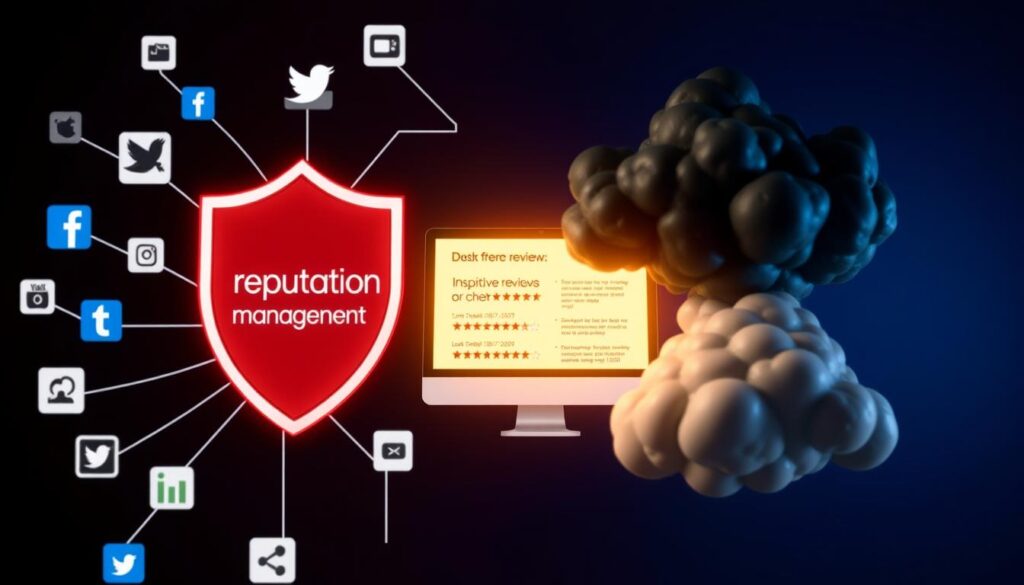At Reputation Return, we know how hard public defamation can hit. It’s when false, damaging words or writings are shared, hurting someone’s good name. This can be in writing (libel) or spoken (slander).
Spotting defamation means finding false, harmful, and unprivileged words or actions. First, document the false statements. Then, check if they’re really wrong. And don’t forget to talk to legal experts.
Our team helps you deal with these tough situations. We offer a full plan to keep and fix your online reputation.
Understanding Defamation and Its Legal Implications
Defamation is a complex legal concept. It includes both written (libel) and spoken (slander) falsehoods that harm someone’s or an organization’s reputation. As the digital world grows, knowing defamation law well is key to protecting your online image.
Types of Defamation: Libel vs. Slander
The tort of defamation has two main types: libel for written statements and slander for spoken ones. Though the rules for each differ, the main idea is the same. It’s about making false claims that damage someone’s or a group’s reputation.
Key Elements of a Valid Defamation Claim
To win a defamation case, you must prove four things: 1) the statement was false, 2) it was shared with others, 3) the person who made it was at fault, and 4) it caused real harm. The rules and how hard it is to prove these can change depending on where you are. So, it’s important to know the laws in your area.
The Role of Privilege in Defamation Cases
In defamation cases, privilege is very important. It gives some people or groups legal protection for what they say, even if it might be harmful. Absolute privilege is a full defense, while qualified privilege might apply if the speaker thought the statement was true.
Understanding defamation law is complex. But, by keeping up with new information and getting help from experts, you can protect your reputation. This way, you can avoid the dangers of defamation.
Handling Public Defamation: Immediate Response Strategies
When facing defamation response strategies and potential damage to your online reputation management, quick action is key. It’s important to stay calm and get legal advice before you speak out. Keeping a record of every defamation case, including when and where it happened, is crucial for a strong defense.
For businesses, quickly addressing concerns from unhappy employees and customers can stop defamation. Online, responding to reviews quickly is vital. Our team at Reputation Return helps create custom strategies to protect your reputation and handle defamation cases.
Here are some immediate steps to take:
- Consult with an experienced defamation attorney to understand your legal rights and options.
- Gather all evidence related to the defamatory statements, including screenshots, recordings, and written documentation.
- Determine if the statements are false and damaging to your reputation.
- Decide whether to pursue a cease and desist letter, a request for retraction, or other pre-litigation actions.
- Develop a strategic response plan in coordination with your legal counsel and public relations team.
Dealing with public defamation needs a thoughtful plan. Acting fast and with legal advice helps protect your reputation. It also opens up the best ways to fix the problem.

| Key Strategies for Immediate Defamation Response | Benefits |
|---|---|
| Consult with a defamation attorney | Navigate legal complexities, understand rights and options |
| Gather all evidence of defamatory statements | Build a strong case, document the damage to reputation |
| Determine if statements are false and harmful | Establish the legal grounds for defamation |
| Consider cease and desist, retraction, or other pre-litigation actions | Attempt to resolve the issue without costly litigation |
| Develop a strategic response plan with legal and PR guidance | Protect your reputation while navigating the legal process |
Legal Remedies and Protection Measures
When faced with public defamation, individuals and businesses have several legal remedies at their disposal. One key option is filing a defamation lawsuit to pursue compensatory and punitive damages. Compensatory damages aim to reimburse for quantifiable losses, such as lost business opportunities or reputational harm, while punitive damages serve to punish intentional misconduct.
Another powerful legal tool is injunctive relief, which can stop the ongoing dissemination of false statements. Courts have seen a surge in injunctions directed at defamatory speech, particularly on the internet, as traditional defamation plaintiffs shift from mass media organizations to individual users of social media platforms.
Documenting Evidence and Building Your Case
Proving damages in a defamation lawsuit requires thorough documentation, including financial records, expert testimony, and client testimonials. Building a strong case involves gathering evidence, conducting comparative analyses, and presenting internal communications reflecting the impact of the defamation. Our experienced team at Reputation Return guides clients through this process, ensuring a comprehensive approach to seeking legal remedies and protecting their reputation.
| Remedy | Purpose | Key Considerations |
|---|---|---|
| Compensatory Damages | Reimbursing quantifiable losses | Detailed financial records, expert testimony, client testimonials |
| Punitive Damages | Punishing intentional misconduct | Evidence of malice or reckless disregard for the truth |
| Injunctive Relief | Stopping ongoing dissemination of false statements | Balancing free speech and reputational protection |
By understanding the legal remedies available and taking proactive steps to document evidence, individuals and businesses can effectively protect their reputations. They can seek appropriate injunctive relief or monetary damages in the face of public defamation.
Conclusion
Managing public reputation protection and defamation recovery needs a smart plan. It involves knowing the law, acting fast, and seeking legal help. At Reputation Return, we help you through this tough time. We offer expert advice to fight back against slander and defamation, especially from narcissistic sources.
Quick action and professional help are vital to handle public defamation well. The First Amendment protects free speech but also sets rules for public figures. Knowing your rights and the law helps you protect your reputation and take back control.
At Reputation Return, we aim to help you manage your online reputation. Our detailed solutions and dedication to your success will make you stronger. Together, we’ll work to restore your reputation and help you succeed.














